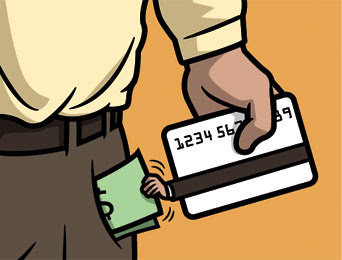Think you're applying for a credit card? Think again.
January 2008
Photo by Christoph Niemann
 When Ken Lauderman saw that $159.95 had been deducted from his bank account, he was confused. He hadn't made any big purchases. In fact, he was a bit short on funds, which is why he had recently applied online for the credit card that EDebitPay offered.
When Ken Lauderman saw that $159.95 had been deducted from his bank account, he was confused. He hadn't made any big purchases. In fact, he was a bit short on funds, which is why he had recently applied online for the credit card that EDebitPay offered.
"The advertisement said they would provide you this Visa card with a high credit limit, and there was no charge or anything like that," says Lauderman, 42, an Army veteran from Coal Township, Pa. "It basically stated that everybody gets approved, no matter what."
To Lauderman, who wanted to rebuild his credit, the deal seemed too good to be true—and it was. For one thing, the card wasn't a credit card. It was a debit card, of the type you can get from your own bank, he says. Except this one came with an application and processing fee of $159.95, a fee he was unaware of.
Lauderman is one of hundreds of people whose bank accounts were debited by EDebitPay, a Southern California company also known as EDP Technologies Corp. and EDP Reporting. Since 2002 the company has marketed online at least 22 different cards (under names such as Acclaim Visa, Sterling Visa, Elite Plus MasterCard and Secure Deposit MasterCard) and other financial services. Applicants are instructed to provide their names, addresses—and bank account numbers.
Lauderman says the company "made it sound like it was part of the application process, to verify that you had a checking account."
According to a Federal Trade Commission complaint against EDP, once EDP had a customer's account number, it debited the $159.95. Customers who called EDP to complain often couldn't get through or were put on hold. Or they were told that by applying they had consented to the fee and were obligated to pay. Lauderman was also hit with bank fees because he had insufficient funds to cover EDP's debit. The Better Business Bureau helped him get his money back.
Over the last three years, the BBB has received more than 760 complaints nationwide against EDebitPay, says Gary Almond, vice president of operations for the BBB's Southern California branch.
In July a federal judge halted EDP operations after the FTC filed a complaint. The company was allowed to resume operations in August, under court order to refrain from misrepresenting its products and services and from debiting consumers' bank accounts without express consent.
EDP attorney Michael Mallow says the company is working with the FTC to resolve the case. He insists EDebitPay didn't intend to scam anyone: In fact, when EDebitPay lowered the fee from $159.95 to $49.95, "application rates doubled," he says. "The only way you could explain [the increase] is that people must have seen the price." He says EDebitPay has made the fee more visible.
Even if EDebitPay has made changes, the BBB's Almond says, many other companies promote prepaid debit cards online—some legitimate, some not—so it's important not to reveal personal information to unfamiliar companies.
If a card issuer does deduct fees from your account without your consent, here's what to do:
- As soon as you discover an unapproved withdrawal, inform your bank. Ask for a federal Regulation E form and say you wish to file a dispute. Ed Magedson, founder of RipOffReport.com, advises on the site to emphasize that you never authorized a debit and to "be persistent."
- Contact your state attorney general's office. Be prepared to report the website where you applied for the card, how you heard about the company, when and how much money was debited from your account and what resolution you are seeking.
- Contact the BBB in the state where the issuer is located.
-aarp








